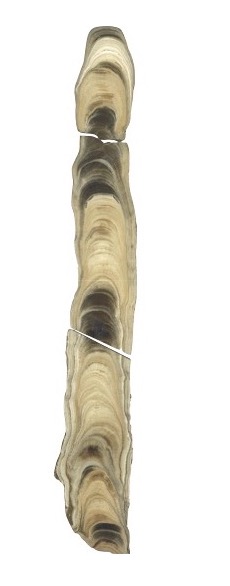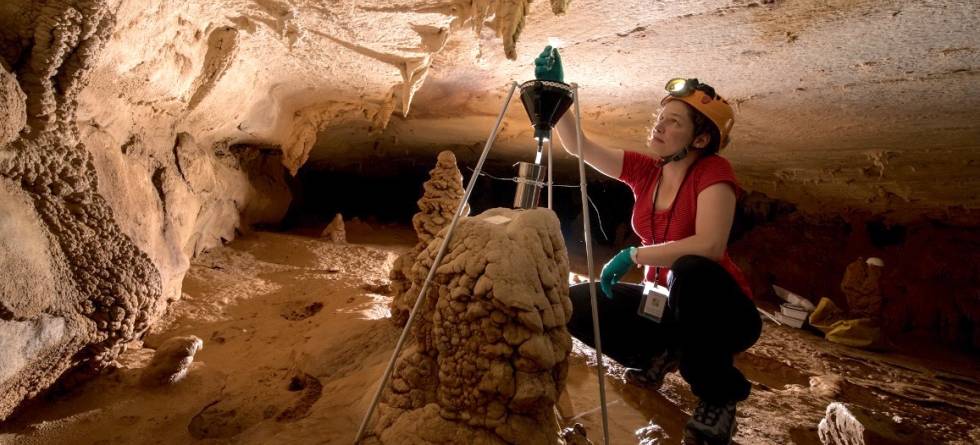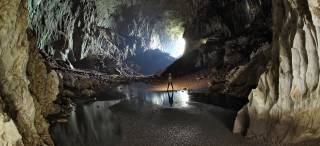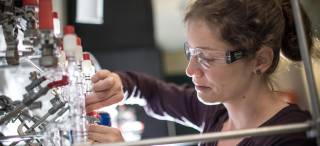When Nele Meckler came to the Bjerknes Centre and the Department of Earth Science nearly six years ago, she had an ERC Starting Grant for new researchers with her. Since then, she has steadily built up a new method of finding the temperatures of the past. The method and laboratory she has founded is groundbreaking. Now, she gets a new ERC grant, for established researchers.
With 2 Million Euro over the coming five years, the ERC Consolidator Grant helps her further develop and polish a new method for finding paleo temperature data.
Needless to say, Meckler was happy when she heard the good news:
“This is a fantastic and unique opportunity to really take the time needed to further develop an already good method to its finer details, and make it as reliable as possible," says Meckler.

Dripstones capture the water of the past
Encapsulated in stalamites and stalactites, which slowly build up on cave floors and ceilings over thousands of years, tiny droplets of water are contained from the time they fell from the ceiling.
In the FluidMICS project Meckler will, together with Yves Krüger (UiB) and other colleagues outside Norway, improve the recreation of the temperatures of the past. To do this they need a better understanding of how the droplets are trapped and preserved in the dripstones.
The dripstones grow slowly. Within the rocks, it is just a fingers length from one ice age to another. And the ice ages make their mark as well, even all the way to the tropics, down in these caves. The dark lines within the stalactites match the ice ages in the Northern hemisphere.
A special laboratory in Bergen
Back home in Bergen, Meckler has since then built a special laboratory. With new methods she can analyse the water´s properties and tell the story of the tropical climate half a million years back.
In the new project Meckler and her colleagues will cooperate with international scientists to look at dripstones from other parts around the world.
“It will be exciting to see how well our method works in other climatic conditions. Our goal is to create a network of time series which covers large areas of the tropics to the mid-latitudes,” she explains.
Earlier methods of extracting past climate data on land has been characterized by great uncertainty.
“Our method is a special opportunity to get very reliable temperature data from way back in time on land. This means that we, with a high degree of precision, can see how the climate in the tropics have reacted to changes in CO2 concentration, and what role the tropics have played through the great climate changes of the past.
Four grants to the UiB
The ERC grants are often said to be the Champions League of European scientists. You have to convince the committee in two rounds, where competitors are knocked out through the process.
This year, four ERC grants were given to the University of Bergen. In Norway a total of eight researchers got their applications approved. The fifth went to Christian Michelsens Institute, while the Norwegian University of Science and Technology got two, and the University of Oslo got one. (link to UiB article)
Tore Furevik, director at the Bjerknes Centre, has also noticed the high share of Bergen grants this time.
“We are very pleased that the University of Bergen received as many as four ERC grants this year, and that one is for Nele Meckler, research leader at the Bjerknes Centre. I am incredibly happy on behalf of Nele Meckler and the entire centre, and look forward to the many exciting results I believe will come from this project,” says Furevik.
Listen to Nele Meckler talking about her method in the UiB podcast series "Amazing research":
Watch Nele Meckler talking about the drip stone secrets from the Bjerknes Centre Anniversary Seminar November 30th 2020 (in Norwegian).



